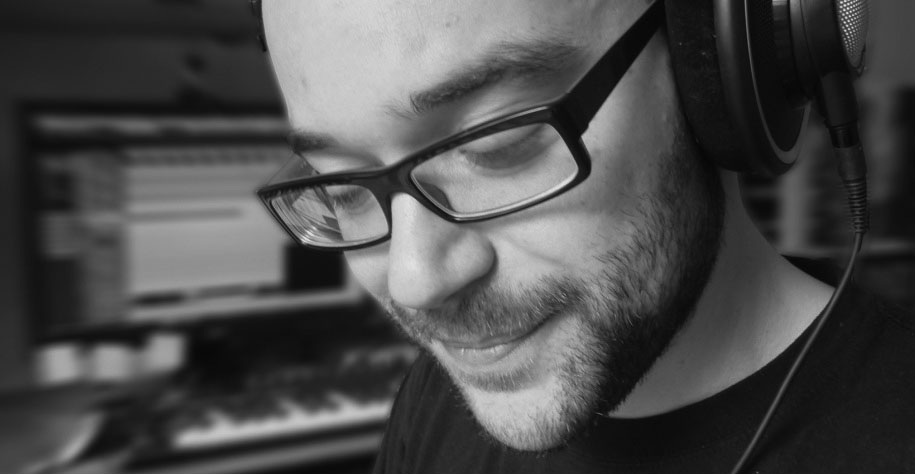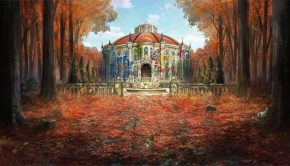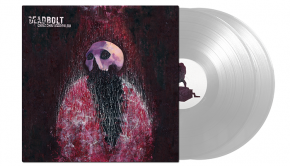Chris Christodoulou Interview: Incredible Paradoxes
Chris Christodoulou is a living, breathing paradox. An individual who assimilate all sorts of influences to create novel, rounded, and personal works. A rare breed of musician who can enthral mainstream audiences with abstract artistic experiments. His soundtracks to indie titles Risk of Rain, The Sea Will Claim Everything, and Droidscape: Basilica are just some of the examples of his huge talent.
In this interview, Christodoulou goes indepth about his musical background and influences, as well as his inspirations for the AGMA-commended Risk of Rain and his other game, movie, and concert projects. Just how did he manage to get the perfect blend? Read his responses and listen to the various samples below.
Interview Credits
Interview Subject: Chris Christodoulou
Interviewer: Chris Greening
Editor: Chris Greening
Coordination: Chris Greening
Interview Content
Chris: Many thanks for your time today, Chris Christodoulou. First of all, could you tell us what experiences led you to becoming a composer? What particularly inspired you to work on films and games?

Chris Christodoulou: I think I was naturally drawn to it. When I was in school I liked physics and math, and music is a perfect collaboration of the two while at the same time transcends them both. I started learning the piano at quite a young age but soon found myself intrigued by the inner workings of the pieces I played. I wanted to find out why things sounded the way they did.
To the eyes and ears of a young boy, film music seemed magical—especially growing up to films like Star Wars and Batman (the good one). As far as game music goes, I was a gamer since the time of ZX Spectrum and there are numerous OSTs I adore, but there are two soundtracks that sealed my decision to actively pursue a career in games: the score of Hitman 2: Silent Assassin by Jesper Kyd and the unsurpassed masterpiece that is the music of Grim Fandango by Peter McConnell. As much as I like doing film music, working on games is my true calling.
Chris: Risk of Rain’s soundtrack is a wonderful mixture of ‘contradictions’: abstract yet accessible, catchy yet atmospheric, wonderful in and out of context, and perplexingly diverse. How did you ensure the soundtrack would satisfy on so many levels? Was it a challenge to find that optimal blend?
Chris Christodoulou: Soon after I figured out Risk of Rain’s “sound” I departed from the notion of keeping it accessible and focused on making something I personally would enjoy. For RoR the following paradox applies: it is surely my most influence-heavy creation, but despite its abundance in musical references it’s still the closest thing to my personal musical vision (excluding orchestral music which is a different ballgame).
The fact that it is so back-to-my-roots probably explains its diversity. As a young boy I was listening to classical, prog-rock, pop and Greek folk, as well as lots of Sound Blaster-generated bleep-blops. Blending all the elements together without causing an explosion was a matter of finding a catalyst. Hopefully, thematic unity and a consistent sound palette acted as such…
Chris: Risk of Rain emphasises that you’re an incredibly versatile composer, capable of writing and fusing electronic, orchestral, rock, and world music, among others. Could you explain how you’ve became so competent in so many styles? Is it safe to assume you’re always searching for new and interesting music?
Chris Christodoulou: Depends on how you define “new”! I’ve mostly given up on contemporary pop (I use the term “pop” very broadly, encompassing most commercial genres). My playlist is compiled by two discrete genres: composers and works that are (poorly) defined as contemporary classical, and modern jazz. Then there are times that I (re)discover older stuff I wasn’t too familiar with (or entirely unaware of) and go through phases of fixation. Last summer it was Loudon Wainwright III, looks like this summer it will be Billy Joel. (Sometimes it feels the song form is a lost art.) And I occasionally need to turn on the really complex prog-metal stuff. Sorry, new neighbors…!
I am also actively on the lookout for new production techniques. I’ve always been a sucker for technology and it’s quite amazing how sound can be manipulated in so many new ways both in the analog and digital domain. I did mention I love physics, right?
As far as my own “versatility”, I can only attribute it to curiosity. I don’t think music is an abstract product of inspiration. It’s an acquired skill that requires constant pursuing and practicing. There will never be a musician that knows all music. Plus, I would feel bored if I had to stick to writing one style all the time.
Chris: On that note, it would be interesting to hear more about your favourites. Which classical composers and contemporary artists do you most admire, and why?
Chris Christodoulou: Beyond that, I really enjoy the sacred (as opposed to secular) music of the Renaissance from Palestrina, Orlando di Lasso, etc. The choir has a mystical quality and the counterpoint in their works is masterful—especially in double choir works.
As much as I appreciate the great masters, when talking about my favourites I would probably jump to Impressionism. Debussy’s orchestral pieces and Satie’s piano works are amazing. Russian composers too are a huge orchestral influence for me, most notably Prokofiev. As a film composer I ritually listen to Holst’s The Planets every couple of months or so.
From the contemporary ones I have to go with Ligeti and Penderecki. Contemporary music has a bad rep, Avant-garde especially (the reason why is a long discussion for another time). To me, listening to Ligeti’s Atmosphères can only be described as a spiritual experience. I think even a person moderately familiar with the orchestra would have a hard time believing that such a sound can be produced without electronics.
On the commercial side of things, my favourite band are The Beatles with Abbey Road being my favourite album of theirs. I grew up listening to Pink Floyd, Queen, later on Dream Theater—pretty standard stuff. Discovering the music of the Esbjörn Svensson Trio was an important moment for me. Similarly, Amon Tobin opened up new horizons as to what you can do with sound.
Lastly, still on the pop side of things, Daft Punk’s Discovery is probably my most influential album. I don’t believe that anyone has listened to it more times or more loudly than I have.
Chris: Focusing on Risk of Rain, we were greatly impressed by how you integrated all the different forces and styles to create a meaningful progressive rock experience. Could you tell us how you overcame the musical and technological challenges of doing this?
Chris Christodoulou: Painstakingly! My sessions were absolutely filled to the brim with automation, plus there were probably as many drum tracks as all the other instruments combined. Being a drummer myself, I took extra care to guarantee that if someone were to perform a live Risk of Rain piece, they would not need an extra hand or foot. On the compositional side things were a bit easier since most of the material derived from a rather manageably sized pool of themes and motifs.
As far as the progressive element, I think it was more about taming it out of instead of putting it in. Complex rhythms are part of my composition process. I sometimes even start with a time signature, or write patterns that span over different irregular bars. I also love polyrhythms. It’s the repressed mathematician inside me…
Chris: Leading on from this, the soundtrack to Risk of Rain also tells quite a story. Can you tell us more about how you developed the soundtrack to both complement the game and serve as a rounded stand-alone experience?
Chris Christodoulou: Making the OST work with the game was mostly about figuring out the right instrumentation. During composition I knew very little about the game’s story, namely the bits in the opening that I’ve seen in early alpha builds and nothing more, so I focused on that. The most important factors were the sci-fi setting and the color palette. Then I started writing and, more or less, let the music lead the way. The directions I had basically were “we need x slow/level pieces and y fast/boss pieces” (that’s over simplification of course but you get the idea).
Compiling the album was more about reordering the tracks to create a musical narrative arc. For example, “Coalescence” is a very contemplative track with an emotional outburst. It would not make sense if it was heard early on in the album. It represents the moment almost at the end of your journey where, standing at the top of the mountain, you can look back and think about the difficult climb. Then there’s “Double F***ing Rainbow” which in the game serves as a boss fight but in the context of the album it is the ultimate struggle before reaching the mountain top.
Another thing I did with the album is divide in two distinct segments, both having a clear beginning and end, separated by a track of filtered white noise. The music is rather dense and I felt the listener should have a moment to take a breath if they wanted to.
Chris: Looking at your other works, The Sea Will Claim Everything is beautiful for the way it places acoustic instruments into a distant soundscape. How and why did you create such a dichotomy of sounds? How did you build on this concept to create subtle emotional effects?
Chris Christodoulou: I think it was partly intentional and partly me not being a very good producer… I wanted to have the ensemble playing in a concert hall but I guess the hall was too empty to constrain the reverberations — which in retrospect might have been a metaphor for how few people have played that game 🙂 By the way, go play The Sea Will Claim Everything, you will most likely enjoy it.
I feel that the open space in which the music of TSWCE lives in is fitting to the game’s world. It is a world of islands and open sea and most of the locations are outside, so I don’t think a small room (or a dry scoring stage) would do the job. I would change many things about the production of that soundtrack if I could do it again but the openness would probably remain the same.
Chris: Hexadecimal is another seemingly paradoxical work of yours: both a lesson in Bach harmony and an experiment in electronic soundscaping. Could you share the story behind this project? What inspired such a deep approach to a seemingly simple game?
Chris Christodoulou: First of all let me clarify that we’re talking about the soundtrack to Droidscape: Basilica. It’s called Hexadecimal because it was made on a tracker, and people who have used trackers will understand.
The story was that my main rig was in Amsterdam at the time but I was on vacation in Greece during the production. I had to either cut my vacation short or work on my laptop, which carried none of my usual toolkit of samples and virtual instruments. So I did the sensible and responsible thing… I got a tracker — a type of software I had never before used — and learn to operate it while working on the soundtrack.
Working on a tracker truly defined the music of DSB. I would never have produced such tracks working on my usual DAW. And the environment felt so much like operating a space ship that it seems very appropriate the music of a sci-fi game such as DSB was made on it.
Before going into DSB I knew pretty much everything there was to know about its story. The influence of Bach throughout the album is a deliberate choice. The story has many religious connotations and Bach defined sacred music of (and beyond) his time and, most importantly, is God. Besides the most obvious influence, the adaptation of one of his preludes, there are a lot Baroque mechanics in the music: the counterpoint, the sturdy harmony and the overloaded embellishments, the defining idiom of the Baroque style in all arts.
Chris: Over the past few years, you have also scored numerous short films in a range of languages. Looking back, what film projects are most significant to you and why?
Chris Christodoulou: Most of the films I’ve worked on were done while attending a Composing for Film master’s programme in Amsterdam. The most significant to me was my graduation film, Desideratum (directed by Maikel Nijnuis) because it was the most challenging in both work load and planning. The film is a 25-minute long fantasy short and the final amount of music turned out just a few seconds short of 23 minutes! That was the first time that I had to organise my material in such an economical way. It will not be taught in any film school anytime soon but in all its flaws, the whole team was very proud of it.
Chris: Together with fellow Conservatory of Amsterdam alumni Robin Assen and Mihkel Zilmer, you formed the music production company The Dam Studios, which already has dozens of credits to its name. Could you tell us more about the scope and accomplishments of the company? Is there much collaboration between the three of you?
Chris Christodoulou: The Dam Studios is a team forged in the strongest of bonds: beer! I’m deeply honoured to call Mihkel and Robin my friends and we were lucky enough to work together on some really inspiring projects. On a day-to-day basis each manages their own projects but there are times where we share tasks or work entirely in unison. Our goal is twofold: a) stay active as composers, producing work we can be proud of, and b) as long as there’s beer in the world, keep on drinking. 🙂
Chris: One work where you did work in unison were the Navarone Acoustic Sessions. Can you elaborate further on the concept of these fascinating sessions and producing these pieces with Robin Assen and Mihkel Zilmer?
Chris Christodoulou: Robin is the drummer for Dutch rock band Navarone and they had this idea of arranging some of their songs to be performed accompanied by a string quartet and harp. Robin and I did arrangements, which you can find on YouTube.
The band loved it and decided to make it into a full-length live show also to be recorded on DVD. Robin, Mihkel and I spent a couple of months doing new arrangements of more songs for an extended ensemble compiled of a string quartet, harp, two woodwinds, piano and a percussionist. The concert took place in Roepaen, a chapel near Nijmegen, and it was a truly mystical experience for all of us! The DVD should be out around Christmas.
Chris: Given the artistic drive of your game soundtracks, it doesn’t surprise me to learn that you have written other concert works. Could you elaborate on the highlights of this area so far?
Chris Christodoulou: Writing for the concert hall is what I studied for many years and what I aspire to do the most. Unfortunately it’s hard to do and hardly provides the daily noodles. But any composer will tell you that having their work come to life by a live ensemble is an incomparable experience, one that the best sample libraries will never be able to replicate. Plus, there’s the wonderful art that is the printed score. The scores of George Crumb are a testament to that, but even traditional scores are beautiful in their own way. I hope to have the luxury to write more orchestral/ensembles pieces in the future.
Chris: Whether or short films, the majority of the projects you worked on were created by very small teams. Could you elaborate on how you initiate and develop these close-knit collaborations? Do you prefer working on smaller projects or would you be open to large-scale projects too?
Chris Christodoulou: I do prefer small teams because the communication is easier but it’s not so much of a choice as a status quo. In the US it is common practice to pursue work in a larger studio as a copyist, arranger, orchestrator, ghost writer, what-have-you, and hope to climb up the ladder, but in Europe it is not done that much. Plus, the indie scene in games, which is my favourite place to work, is usually about small teams and that also means I can share thoughts beyond just the music. This is great since being a gamer I love nothing more than being able to enjoy a game I’ve worked on.
Working on short films is interesting too since you usually deal with a full-blown team but of miniature size. Being among creative people of different disciplines is extremely educational. I’ve learned more about film music sitting in the editing room than any other place.
Chris: Other published works include a contribution to the Anodyne Remix Album. How did you approach interpreting the original material for this album? Are you open to more collaborative projects with the indie or chiptune communities in the future?
Chris Christodoulou: Sean Hogan’s direction was “do whatever you want”, so I did. I combined music from three Anodyne pieces (and sampled a couple more that turned into SFX tracks) and made this prog-turns-into-power-ballad piece. I think Sean liked it… I’m grateful for the opportunity. He was one of the first people in the indie scene to express his admiration for the music of TSWCE and cannot thank him enough for the support!
I have in the vault another piece I wrote for an album compiled by C-jeff (do look him up if you don’t know who he is) but I’m not sure when this project will come out. In general I’m completely open to collaborations and love nothing more than exchanging ideas with other composers!
Chris: With game, film, and concert works all behind you, it would be interesting to hear your plans for the future. Do you wish to focus more on one of these areas? Or is versatility in projects something you also value?
Chris Christodoulou: I think I have plenty of games still in front of me. This year I was lucky enough to be involved in some really inspiring projects that will be out in the coming months.
The past Autumn I relocated to Athens, Greece after four years of living in Amsterdam. Athens is a boiling pot filled with art right now, much of the heat generated by the crisis. I expect many interesting things to happen and can only hope to be a small part of it all. I will surely pursue more games because I love it but I’m very interested in writing for theatre, especially productions that would use live musicians.
Chris: Chris Christodoulou, thank you so much for your detailed and inspiring answers. Is there anything else you would like to say about yourself or your works? In addition, do you have any message to readers and fans around the world? All the best for the future.
Chris Christodoulou: Thank you so much for the invitation! My constant message to people considering going into music is this: study. Music is a product of the mind, not the heart.
Posted on June 6, 2014 by Chris Greening. Last modified on June 5, 2014.














